iOS SDK
SDK Setup

SDK Installation
Cocoapods
1. Create a Podfile file with the below commands.
Podfile file with the below commands.cd path/to/project
touch Podfile2. Edit Podfile as below.
Podfile as below.target '[Project Name]' do
pod 'AirBridge', '1.33.2'
endAirbridge iOS SDK 1.18.0+ requires Cocoapods 1.11.0+
3. Run the following commands in your terminal.
cd path/to/project
pod install --repo-updateWhen no
podcommand is found, installcocoapodswith the below command.
sudo gem install cocoapods
Swift Package Manager (SPM)
The iOS SDK can be installed through Swift Package Manager (SPM). SDK versions 1.23.0, 1.24.0 and 1.24.4+ currently support SPM.
1. Move to "File" → "Add Packages" in Xcode.
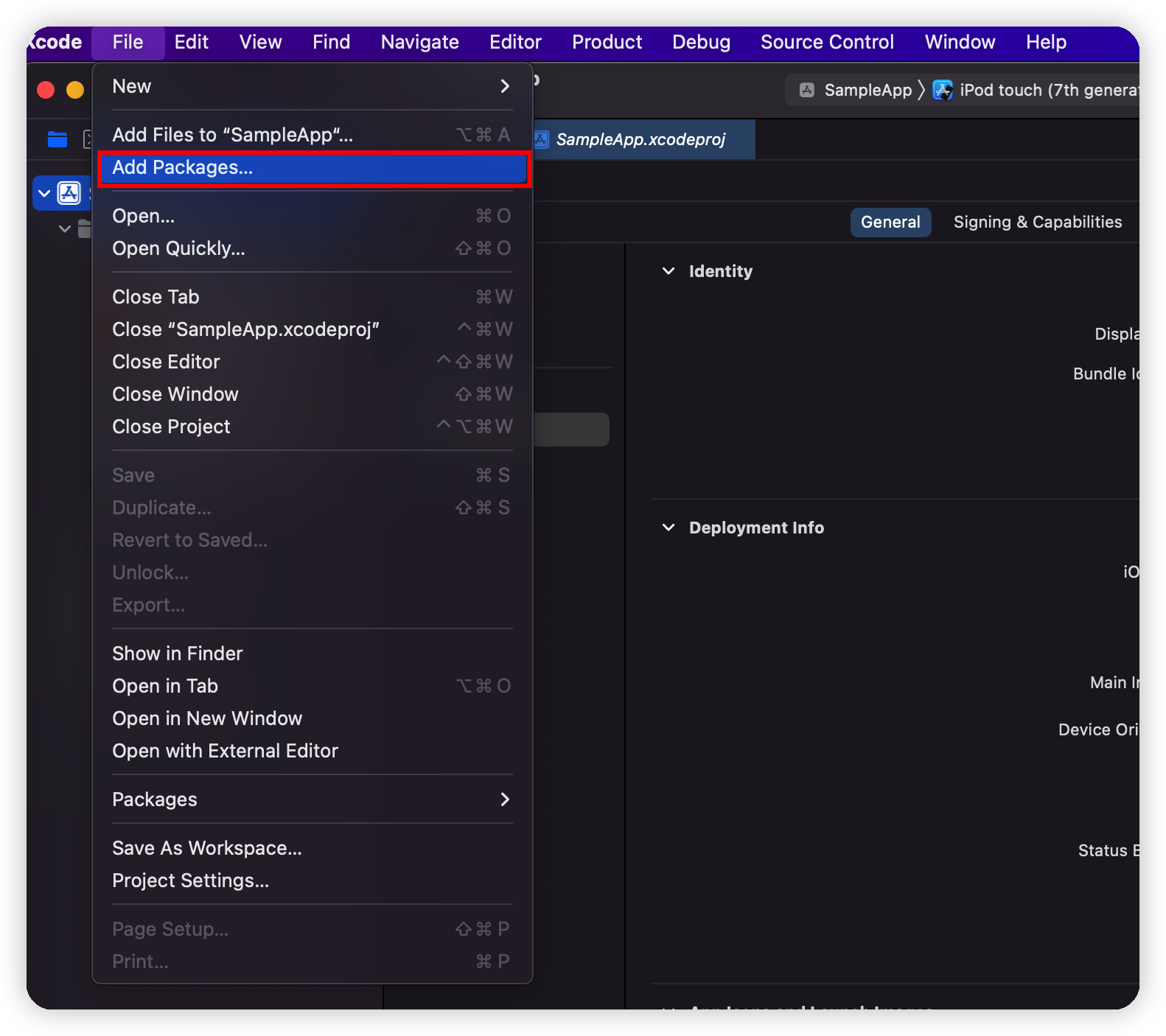
2. Add the Airbridge iOS SDK
Search for https://github.com/ab180/airbridge-ios-sdk-deploy once the "Add Packages" window pops up. Select the version to be installed and click the "Add Package" button.
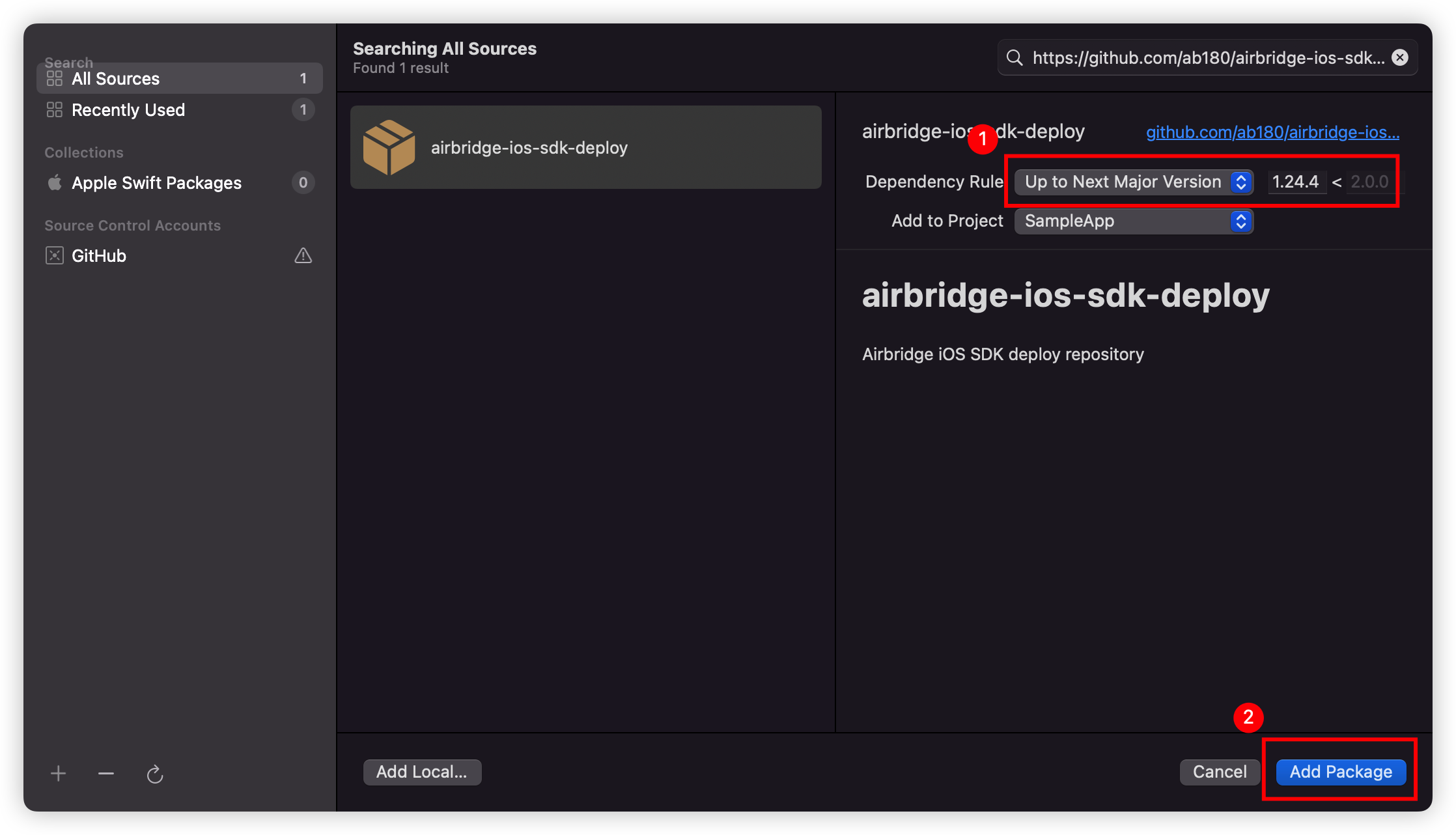
3. Select Target for Package Installation.
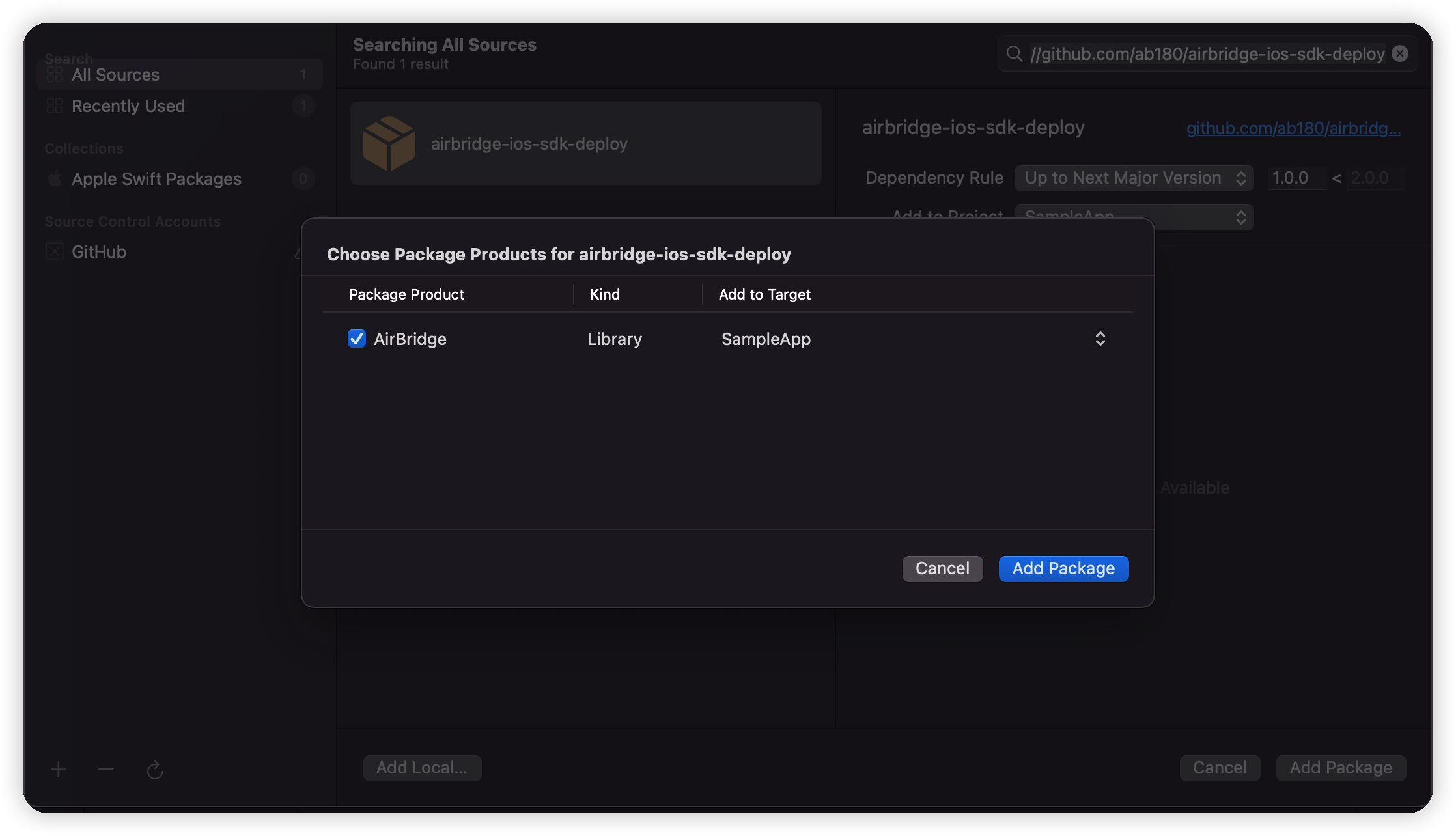
4. Check Package Installation.
Airbridge will be shown under "Package Dependencies" if the SDK was properly installed.
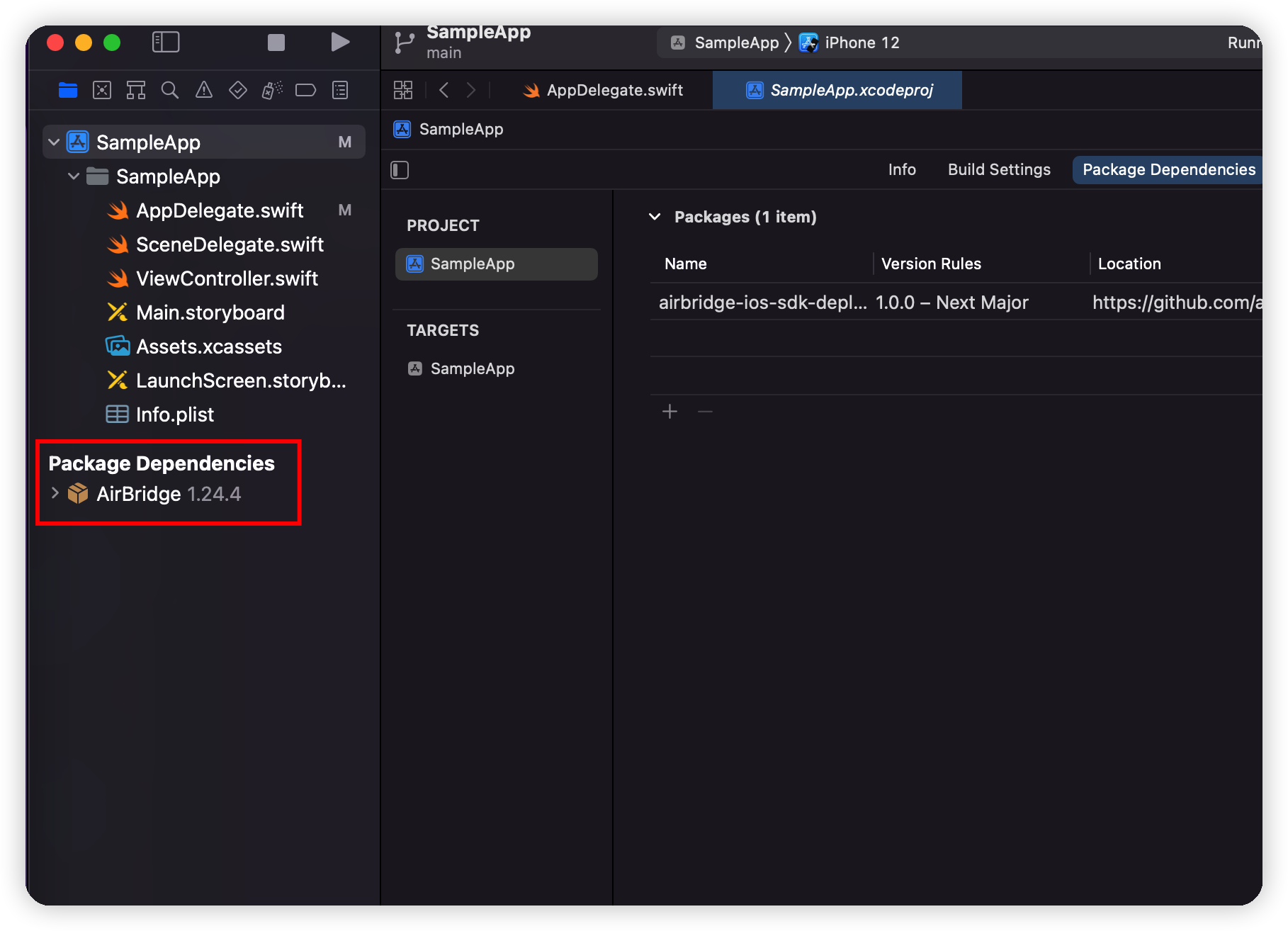
Direct Installation
1. Adding the AirBridge.framework
AirBridge.framework- Download
AirBridge.framework - Click "Xcode → Project file → General → Frameworks, Libraries, and Embedded Content → +"
- Click "Add Other.. → Add Files.." at the bottom right hand corner
- Add the
AirBridge.xcframeworkfolder that is in the file downloaded at step 1. - Set
AirBridge.xcframeworkas "Do not Embed".
2. Adding Dependency Frameworks
- Click "Xcode → Project file → General → Frameworks, Libraries, and Embedded Content → +".
- Add the 6 frameworks in the table below.
- Set these frameworks as "Do not Embed"
- Go to "Xcode → Project file → Build Phase → Link Binary with Libraries".
- Set the below six frameworks' statuses to
Optional.
| Framework | Description |
|---|---|
| AdSupport.framework | Used to collect IDFA. |
| iAd.framework | Used to collect Apple search ads attribution. |
| CoreTelephony.framework | Used to collect carrier information. |
| StoreKit.framework | Used to collect SKAdNetwork information. |
| AppTrackingTransparency.framework | Used to collect tracking authorization status. |
| AdServices.framework | Used to collect Apple Search Ads attribution information. (iOS 14.3+) |
Project Setup
Initialization
Initialize SDK by adding following code at the beginning of the application:didFinishLaunchingWithOptions: method in the AppDelegate file.
#import <AirBridge/AirBridge.h>
- (BOOL)application:(UIApplication *)application didFinishLaunchingWithOptions:(NSDictionary*)launchOptions {
[AirBridge getInstance:@"YOUR_APP_TOKEN" appName:@"YOUR_APP_NAME" withLaunchOptions:launchOptions];
...
}import AirBridge
func application(_ application: UIApplication, didFinishLaunchingWithOptions launchOptions: [UIApplication.LaunchOptionsKey: Any]?) -> Bool {
AirBridge.getInstance("YOUR_APP_TOKEN", appName:"YOUR_APP_NAME", withLaunchOptions:launchOptions)
...
}If you're using an environment where AppDelegate doesn't exist (e.g. SwiftUI), you would initialize the SDK through the App class under @main.
// YourprojectApp.swift
import SwiftUI
import AirBridge
@main
struct OnlyUIApp: App {
init() {
AirBridge.getInstance("YOUR_APP_TOKEN", appName: "YOUR_APP_NAME")
}
var body: some Scene {
WindowGroup {
ContentView()
}
}
}
YOUR_APP_NAMEcan be found at the "Airbridge dashboard → Settings → Tokens → App Name".
YOUR_APP_TOKENcan be found at the "Airbridge dashboard → Settings → Tokens → App SDK Token".
Accept IDFA Terms and Conditions
In order to use the SDK, you must agree to the "IDFA terms and conditions" when publishing the application to the App Store.
- Click "Yes" to "Does this app use the Advertising Identifier (IDFA)?
- Check "Attribute this app Install to a previously served advertisement".
- Check "Attribute an action taken within this app to a previously served advertisement".
- Check "Limit Ad Tracking Setting in iOS".
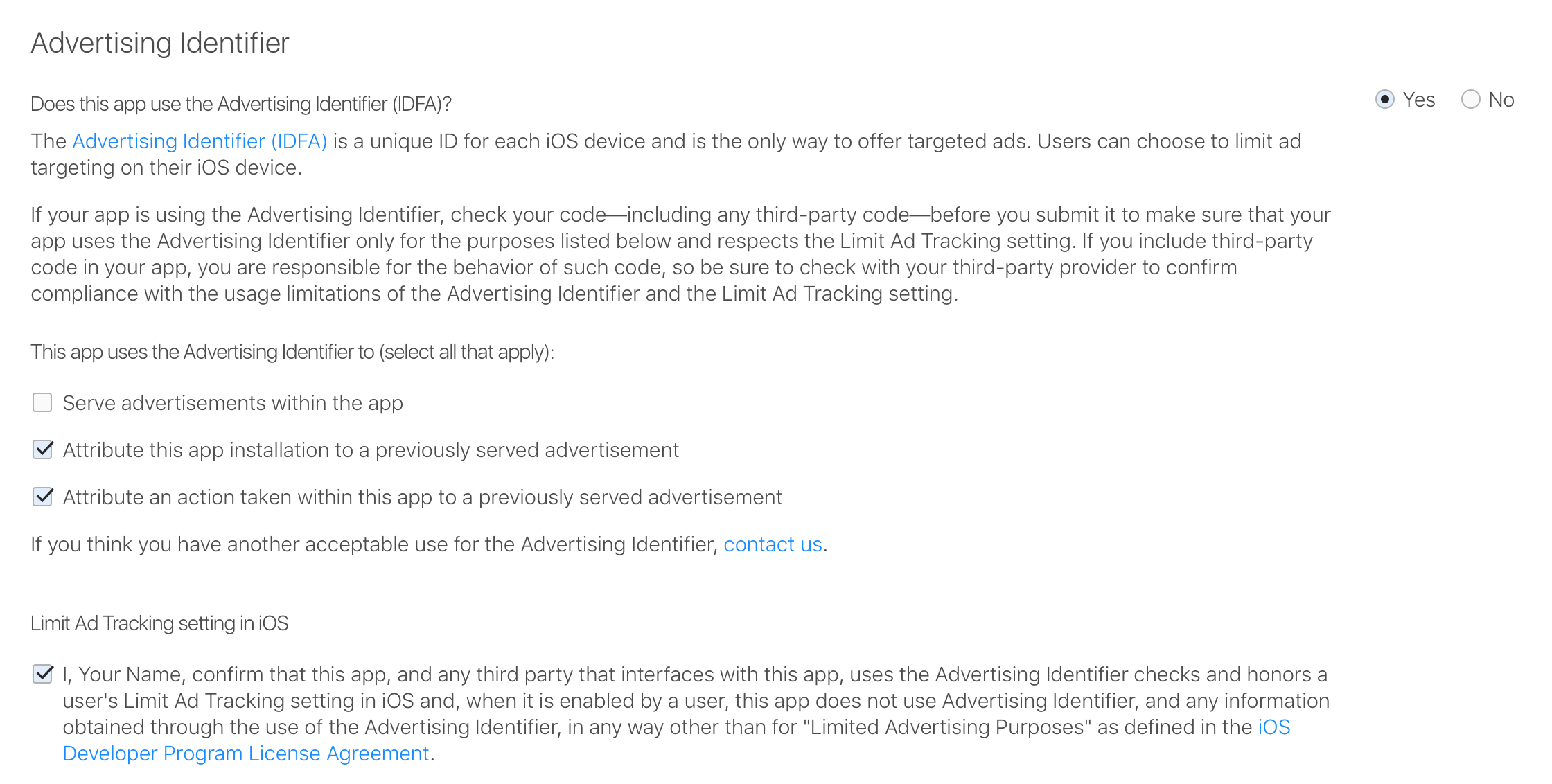
Testing the SDK
Check if "install" events are being sent when installing and running the application.
Check in the Airbridge Dashboard
Events from the SDK are shown on the "Airbridge Dashboard → Raw Data → App Real-time Logs".
- Go to "Airbridge Dashboard → Raw Data → App Real-time Logs".
- Search for your "iOS IDFA" in the search box.
Logs may be delayed for up to 5 minutes.
Check with Logs
Logs will be printed to Xcode if you insert the following at the beginning of the code that initializes the SDK in your AppDelegate file.
[AirBridge setLogLevel:AB_LOG_ALL];
[AirBridge getInstance:@"YOUR_APP_TOKEN" appName:@"YOUR_APP_NAME" withLaunchOptions:launchOptions];AirBridge.setLogLevel(.LOG_ALL)
AirBridge.getInstance("YOUR_APP_TOKEN", appName:"YOUR_APP_NAME", withLaunchOptions:launchOptions)Deep Link Setup
Dashboard Setup
The following information is needed at "Airbridge Dashboard → Tracking Link → Deep Link".
- iOS URI Scheme
- iOS App ID
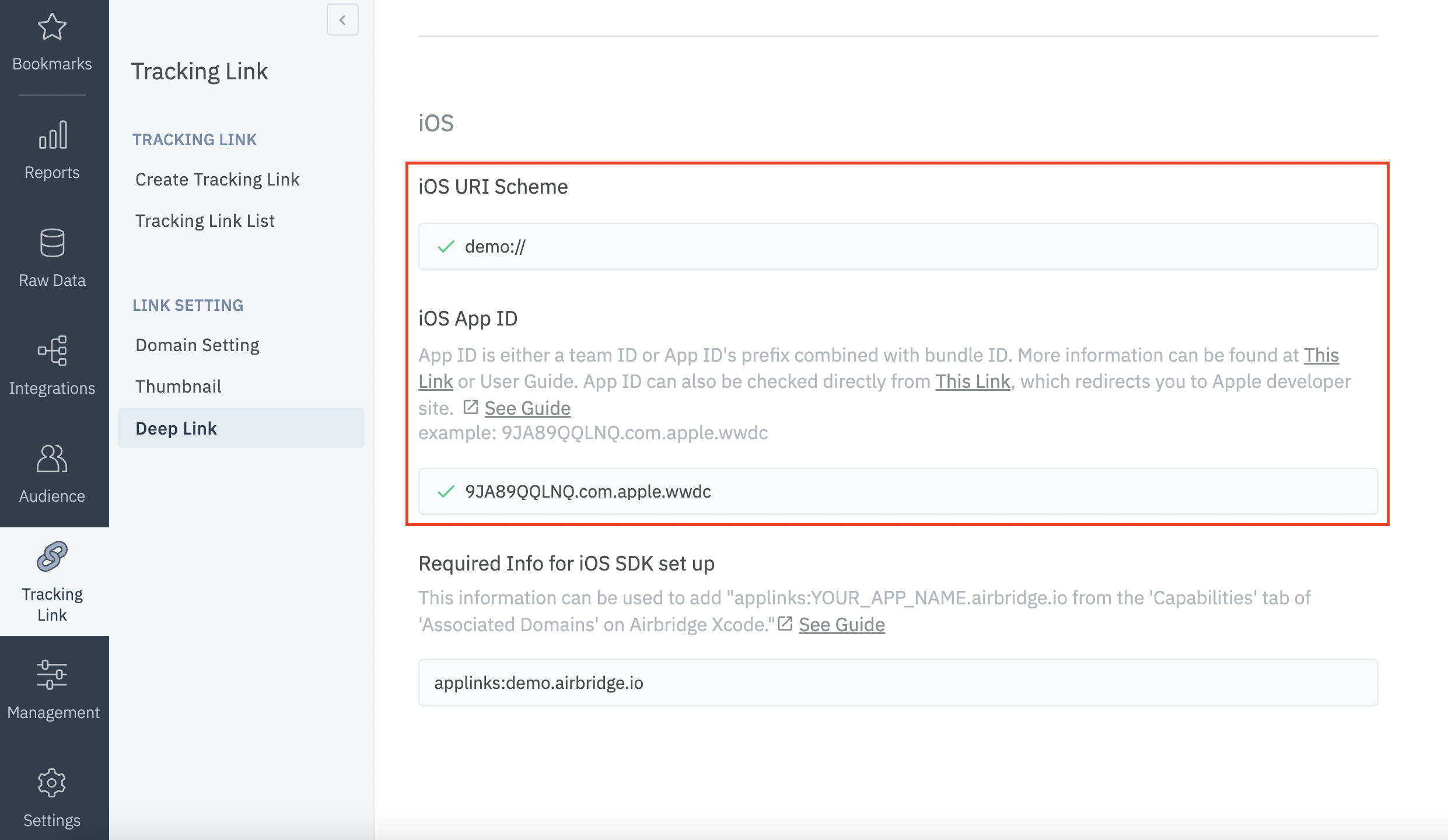
iOS URI Scheme
Enter the URI scheme that will be used, including ://, in the iOS URI Scheme area as shown in the picture above.
e.g.
example://,yoururischeme://
Airbridge supports lowercase letters, numbers, and some special characters (
-,+,.) for URI Schemes.
iOS App ID
- Go to
Identifiersat https://developer.apple.com/account/resources. - Click identifier of the application that you want to track.
- Copy the identifier information to "iOS App ID" at the Airbridge dashboard in the following format: "App ID Prefix" + "." + "Bundle ID" (e.g. 9JA89QQLNQ.com.apple.wwdc)
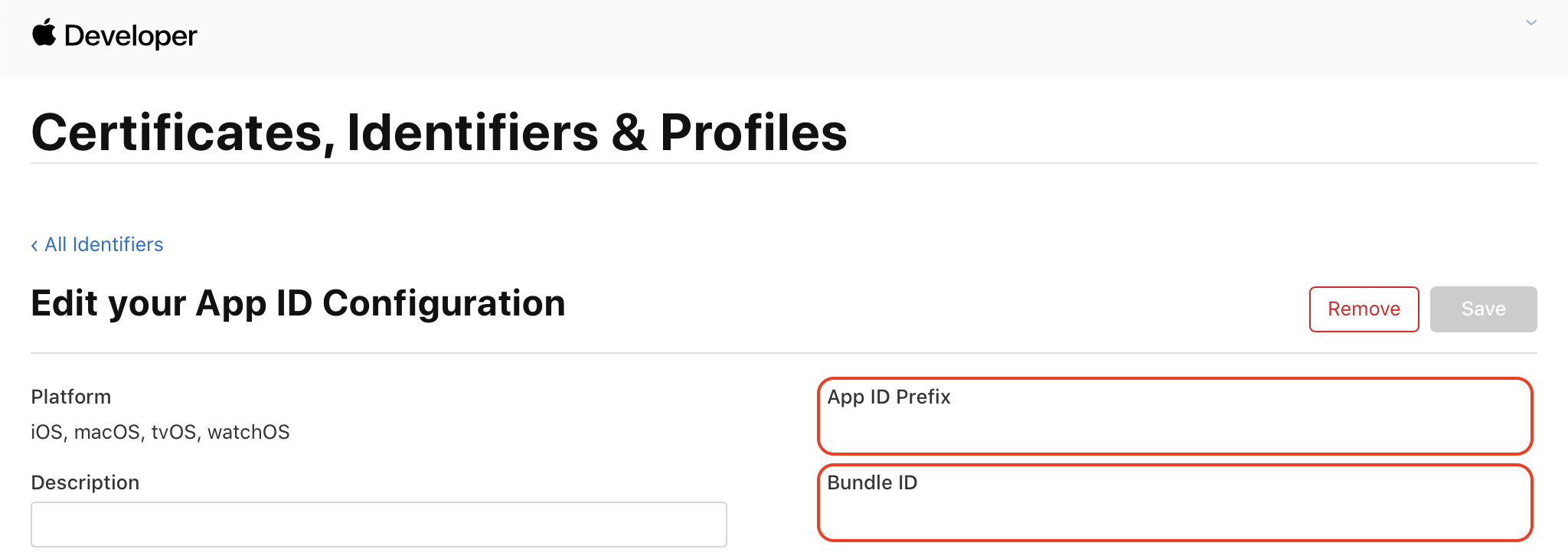
Project Setup
Scheme
- Go to "Xcode → Project file → Info → URL Types".
- From the Airbridge dashboard, copy "iOS URI Scheme" to Xcode's "URL Schemes". (Do not include
://)
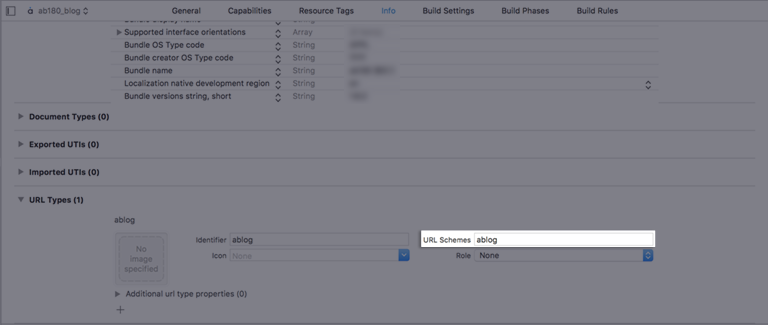
Universal Link
- Go to "Xcode → Project file → Signing & Capabilities".
- Click "+ Capability" and add "Associated Domains".
- Add
applinks:YOUR_APP_NAME.airbridge.ioto "Associated Domains". - Add
applinks:YOUR_APP_NAME.deeplink.pageto "Associated Domains".
YOUR_APP_NAMEcan be found at the "Airbridge dashboard → Settings → Tokens → App Name".Please refer to Troubleshooting → Webcredentials if you want to use the autofill feature.
Send deeplink information to SDK
For projects using AppDelegate
AppDelegateEvents are usually sent through the application(_:open:options:) method in AppDelegate for apps that support iOS 12 and below.
-
Open
ios/[Project name]/AppDelegate. -
Send deeplink information to the SDK when the application is opened through schemes by calling the
handleURLSchemeDeeplinkmethod at the beginning of the following function.
- (BOOL)application:(UIApplication *)application
openURL:(NSURL *)url
options:(NSDictionary<UIApplicationOpenURLOptionsKey, id>*)options
{
[AirBridge.deeplink handleURLSchemeDeeplink:url];
return YES;
}func application(_ app: UIApplication,
open url: URL,
options: [UIApplication.OpenURLOptionsKey : Any] = [:]) -> Bool
{
AirBridge.deeplink()?.handleURLSchemeDeeplink(url)
return true
}- Send deeplink information to the SDK when the application is opened through an universal link by calling the
handleUserActivitymethod at the beginning of the following function.
func application(_ application: UIApplication,
continue userActivity: NSUserActivity,
restorationHandler: @escaping ([UIUserActivityRestoring]?) -> Void) -> Bool
{
AirBridge.deeplink()?.handleUserActivity(userActivity)
return true
}func application(_ application: UIApplication,
continue userActivity: NSUserActivity,
restorationHandler: @escaping ([UIUserActivityRestoring]?) -> Void) -> Bool
{
AirBridge.deeplink()?.handleUserActivity(userActivity)
return true
}Links are forwarded to
SceneDelegate, notAppDelegate, for projects usingSceneDelegate. Please refer to the next section on how to receive deep links throughSceneDelegate.
For projects using SceneDelegate
SceneDelegateDeep links are forwarded to the following methods for projects that use SceneDelegate and support iOS 13+.
- When the application was loaded from a "Not running" status.
scene(_:willConnectTo:options:)
- All other situations (e.g. background)
- Universal link:
scene(_:continue:) - Scheme link:
scene(_:openURLContexts:)
- Universal link:
import UIKit
import AirBridge
@available(iOS 13, *)
class SceneDelegate: UIWindowSceneDelegate {
var window: UIWindow?
// Receive links after the app's killed
func scene(_ scene: UIScene, willConnectTo session: UISceneSession, options connectionOptions: UIScene.ConnectionOptions) {
if let schemeLinkURL = connectionOptions.urlContexts.first?.url {
// Scheme
AirBridge.deeplink()?.handleURLSchemeDeeplink(schemeLinkURL)
} else if let userActivity = connectionOptions.userActivities.first {
// Universal
AirBridge.deeplink()?.handle(userActivity)
}
// ...
}
// Receive universal link
func scene(_ scene: UIScene, continue userActivity: NSUserActivity) {
AirBridge.deeplink().handle(userActivity)
// ...
}
// Receive scheme link
func scene(_ scene: UIScene, openURLContexts URLContexts: Set<UIOpenURLContext>) {
guard let schemeLinkURL = URLContexts.first?.url else {
return
}
AirBridge.deeplink().handleURLSchemeDeeplink(schemeLinkURL)
// ...
}
}For Projects using neither AppDelegate nor SceneDelegate (SwiftUI)
AppDelegate nor SceneDelegate (SwiftUI)If you are using SwiftUI without SceneDelegate, deep links would be forwarded through onOpenURL. This method would be added to your App class under @main.
import SwiftUI
import AirBridge
@main
@available(iOS 14, *)
struct OnlyUIApp: App {
...
var body: some Scene {
WindowGroup {
ContentView()
.onOpenURL { url in
if url.scheme != "http" && url.scheme != "https" {
// Scheme link
AirBridge.deeplink()?.handleURLSchemeDeeplink(url)
}
}
.onContinueUserActivity(NSUserActivityTypeBrowsingWeb) { userActivity in
AirBridge.deeplink()?.handle(userActivity)
}
}
}
}If
SceneDelegateis being used in yourSwiftUIenvironment,onOpenUrlcannot be used. Please refer to the For projects usingSceneDelegatesection.
Deep link Callback Setting
If you are using AppDelegate
AppDelegate- Open
ios/[Project file]/AppDelegate. - Use the
setDeeplinkCallbackmethod to setup the callback that will be called when the application is opened through a deep link.
- (BOOL)application:(UIApplication *)application didFinishLaunchingWithOptions:(NSDictionary*)launchOptions {
[AirBridge getInstance:@"YOUR_APP_TOKEN" appName:@"YOUR_APP_NAME" withLaunchOptions:launchOptions];
[AirBridge.deeplink setDeeplinkCallback:^(NSString* deeplink) {
// Deeplink from airbridge = YOUR_SCHEME://...
NSLog(@"DeeplinkCallback : %@", deeplink);
}];
}func application(_ application: UIApplication, didFinishLaunchingWithOptions launchOptions: [UIApplication.LaunchOptionsKey:
Any]?) -> Bool {
AirBridge.getInstance("YOUR_APP_TOKEN", appName: "YOUR_APP_NAME", withLaunchOptions: launchOptions)
AirBridge.deeplink()?.setDeeplinkCallback({ (deeplink) in
// Code to run when opening app with a deep link
// Airbridge Deeplink = YOUR_SCHEME://...
NSLog("DeeplinkCallback : %@", deeplink)
})
return true
}If you are not using AppDelegate (SwiftUI)
AppDelegate (SwiftUI)Please add the following method to the App class under @main.
import SwiftUI
import AirBridge
@main
@available(iOS 14, *)
struct OnlyUIApp: App {
init() {
AirBridge.getInstance("YOUR_APP_TOKEN", appName: "YOUR_APP_NAME")
AirBridge.deeplink()?.setDeeplinkCallback { deeplink in
print(deeplink)
}
}
var body: some Scene {
WindowGroup {
ContentView()
}
}
}All deep links that open apps are sent to
DeeplinkCallback
Of those deep links, "Airbridge deep links" will be sent using the "iOS URI Scheme" (YOUR_SCHEME://...) that was set in the Airbridge dashboard.A deferred deep link will be sent to
DeeplinkCallbackif ATT status is approved or a timeout occurs.
A deferred deep link will contain adeferred=truequery parameter.
For
Airbridge iOS SDK 1.10.0 ~ 1.10.9, the "Airbridge deep link" will be sent ashttps://YOUR_APP_NAME.airbridge.io/....For
Airbridge iOS SDK ~1.9.10, the "Airbridge deep link" will be sent as eitherhttps://YOUR_APP_NAME.airbridge.io/...orYOUR_SCHEME://....
Custom Domain Setting (Optional)
If you are using a custom domain as an Airbridge tracking link, follow the below steps. (Replace example.com with custom domain)
- Go to "Xcode → Project file → Signing & Capabilities → Associated Domains".
- Click "+" button and add
applinks:example.com. - Open
info.plist. - Add the following value.
Test Deep Link
Check if the application is run and the deep link event is sent when "Airbridge deep links" are clicked on. Make sure that the deep link follows the "iOS URI Scheme" format configured in your Airbridge dashboard. (e.g. example://)
- Click deep link
- See if the deep link event appears at "Airbridge dashboard → Raw Data → App Real-time Logs"
User Setup
User Identifier Setup
Once a user identifier information is sent to the SDK, all events thereafter will contain the corresponding user identifier information.
[AirBridge.state setUserID:@"personID"];
[AirBridge.state setUserEmail:@"[email protected]"];
[AirBridge.state setUserPhone:@"1(123)123-1234"]
// user alias changed with inserted dictionary.
[AirBridge.state setUserAlias:@{@"key": @"value"}];
// key, value is inserted to existed user alias.
[AirBridge.state addUserAliasWithKey:@"key" value:@"value"];AirBridge.state()?.setUserID("personID")
AirBridge.state()?.setUserEmail("[email protected]")
AirBridge.state()?.setUserPhone("(123)123-1234")
// 입력된 dictionary 로 user alias 가 교체됩니다.
AirBridge.state()?.setUserAlias(["key": "value"])
// 기존의 user alias 에 해당 key, value 가 추가됩니다.
AirBridge.state()?.addUserAlias(withKey: "key", value: "value")| Name | Description | Limitations |
|---|---|---|
ID |
User ID |
|
User Email |
Hashed by default |
|
Phone |
User phone number |
Hashed by default |
Alias |
User alias |
|
User Attributes Setup
Additional user attributes can be used for a more accurate MTA (Multi-Touch Attribution) analysis, additional internal data analysis, and linking third-party solutions.
// user attributes changed with inserted dictionary.
[AirBridge.state setUserAttributes:@{@"key": @"value"}];
// key, value is inserted to existed user attributes.
[AirBridge.state addUserAttributesWithKey:@"key" value:@"value"];// 입력된 dictionary 로 user attributes 가 교체됩니다.
AirBridge.state()?.setUserAttributes(["key": "value" as NSObject])
// 기존의 user attributes 에 해당 key, value 가 추가됩니다.
AirBridge.state()?.addUserAttributes(withKey: "key", value: "value" as NSObject)| Name | Description | Limit |
|---|---|---|
Attributes |
User attributes |
|
Test User Information Setup
Make sure that your user information settings are being properly sent through the SDK.
- Configure user identifier information.
- Send an event using the SDK.
- Click the event at "Airbridge dashboard → Raw Data → App Real-time Logs"
- Check if the user information is correctly sent under the
userblock.
Device Setup
Setup Device Alias
Setup a device alias through the Airbridge SDK. The alias will be sustained even after the app closes, unless otherwise deleted.
AirBridge.state()?.setDeviceAlias(key: "ADD_YOUR_KEY", value: "AND_YOUR_VALUE")
AirBridge.state()?.removeDeviceAlias(key: "DELETE_THIS_KEY")
AirBridge.state().clearDeviceAlias()[AirBridge.state setDeviceAliasWithKey: "ADD_YOUR_KEY", value: "AND_YOUR_VALUE"];
[AirBridge.state removeDeviceAliasWithKey: "DELETE_THIS_KEY"];
[AirBridge.state clearDeviceAlias];| Method | Description |
|---|---|
setDeviceAlias(withKey: String, value: String) | Add the key value pair to the device identifier. |
removeDeviceAlias(withKey: String) | Delete the corresponding device alias. |
clearDeviceAlias() | Delete all device aliases. |
Event Setup
When important user actions occur, in-app events can be sent to measure the performance of each channel.
All event parameters are optional. However, more information about the event will help provide a more accurate analysis.
Sending Events
Send events with the SDK.
#import <AirBridge/ABInAppEvent.h>
ABInAppEvent* event = [[ABInAppEvent alloc] init];
[event setCategory:@"category"];
[event setAction:@"action"];
[event setLabel:@"label"];
[event setValue:@(123)];
[event setCustoms:@{@"key": @"value"}];
// Semantic Attributes Option 1
ABSemanticAttributes* semanticAttributes = [[ABSemanticAttributes alloc] init];
semanticAttributes.transactionID = @"transaction_123";
[event setSemanticAttributes:semanticAttributes];
// Semantic Attributes Option 2
// For more details, please check following page
// https://developers.airbridge.io/docs/event-structure#semantic-attributes
[event setSemantics:@{@"transactionID": @"transaction_123"}];
[event send];let event = ABInAppEvent()
event?.setCategory("category")
event?.setAction("action")
event?.setLabel("label")
event?.setValue(123)
event?.setCustoms(["key": "value"])
// Semantic Attributes Option 1
let semanticAttributes = ABSemanticAttributes()
semanticAttributes?.transactionID = "transaction_123"
event?.setSemanticAttributes(semanticAttributes)
// Semantic Attributes Option 2
// For more details, please check following page
// https://developers.airbridge.io/docs/event-structure#semantic-attributes
event?.setSemantics(["transactionID": "transaction_123"])
event?.send()| Parameter | Description |
|---|---|
| setCategory | Event name (required) |
| setAction | Event attribute 1 |
| setLabel | Event attribute 2 |
| setValue | Event attribute value |
| setCustoms | Additional custom attributes |
| setSemanticAttributes | Additional semantic attributes (Map) |
Standard Events
Send standard user events with the SDK.
setAction,setLabel,setValue,setCustoms,setSemantics,setSemanticAttributescan also be used when sending standard events.
User Sign Up
#import <AirBridge/ABUser.h>
#import <AirBridge/ABInAppEvent.h>
#import <AirBridge/ABCategory.h>
ABUser* user = [[ABUser alloc] init];
user.ID = @"personID";
user.email = @"[email protected]";
user.phone = @"1(123)123-1234";
user.alias = @{
@"key": @"value",
};
user.attributes = @{
@"key": @"value",
};
[AirBridge.state setUser:user];
ABInAppEvent* event = [[ABInAppEvent alloc] init];
[event setCategory:ABCategory.signUp];
[event send];let user = ABUser()
user.id = "personID"
user.email = "[email protected]"
user.phone = "(123)123-1234"
user.attributes = [
"key": "value" as NSObject,
]
user.alias = [
"key": "value",
]
AirBridge.state().setUser(user)
let event = ABInAppEvent()
event?.setCategory(ABCategory.signUp)
event?.send()User Sign In
#import <AirBridge/ABUser.h>
#import <AirBridge/ABInAppEvent.h>
#import <AirBridge/ABCategory.h>
ABUser* user = [[ABUser alloc] init];
user.ID = @"personID";
user.email = @"[email protected]";
user.phone = @"1(123)123-1234)";
user.alias = @{
@"key": @"value",
};
user.attributes = @{
@"key": @"value",
};
[AirBridge.state setUser:user];
ABInAppEvent* event = [[ABInAppEvent alloc] init];
[event setCategory:ABCategory.signIn];
[event send];let user = ABUser()
user.id = "personID"
user.email = "[email protected]"
user.phone = "(123)123-1234"
user.attributes = [
"key": "value" as NSObject,
]
user.alias = [
"key": "value",
]
AirBridge.state().setUser(user)
let event = ABInAppEvent()
event?.setCategory(ABCategory.signIn)
event?.send()User Sign Out
#import <AirBridge/ABInAppEvent.h>
#import <AirBridge/ABCategory.h>
ABInAppEvent* event = [[ABInAppEvent alloc] init];
[event setCategory:ABCategory.signOut];
[AirBridge.state setUser:[[ABUser alloc] init]];let event = ABInAppEvent()
event?.setCategory(ABCategory.signOut)
event?.send()
AirBridge.state().setUser(ABUser())View Home Screen
#import <AirBridge/ABInAppEvent.h>
#import <AirBridge/ABCategory.h>
ABInAppEvent* event = [[ABInAppEvent alloc] init];
[event setCategory:ABCategory.viewHome];
[event send];let event = ABInAppEvent()
event?.setCategory(ABCategory.viewHome)
event?.send()View Product Detail
#import <AirBridge/ABProduct.h>
#import <AirBridge/ABInAppEvent.h>
#import <AirBridge/ABCategory.h>
#import <AirBridge/ABSemanticsKey.h>
ABProduct* product1 = [[ABProduct alloc] init];
product1.idx = @"coke_zero";
product1.name = @"Coke Zero";
product1.price = @100;
product1.currency = @"USD";
product1.orderPosition = @1;
product1.quantity = @1;
ABInAppEvent* event = [[ABInAppEvent alloc] init];
[event setCategory:ABCategory.viewProductDetail];
[event setSemantics:@{
ABSemanticsKey.products: @[product1.toDictionary],
}];
[event send];let product1 = ABProduct()
product1.idx = "coke_zero"
product1.name = "Coke Zero"
product1.price = 100
product1.currency = "USD"
product1.orderPosition = 1
product1.quantity = 1
let event = ABInAppEvent()
event?.setCategory(ABCategory.viewProductDetail)
event?.setSemantics([
ABSemanticsKey.products: [
product1.toDictionary(),
],
])
event?.send()View Product List
#import <AirBridge/ABProduct.h>
#import <AirBridge/ABInAppEvent.h>
#import <AirBridge/ABCategory.h>
#import <AirBridge/ABSemanticsKey.h>
ABProduct* product1 = [[ABProduct alloc] init];
product1.idx = @"coke_zero";
product1.name = @"Coke Zero";
product1.price = @100;
product1.currency = @"USD";
product1.orderPosition = @1;
product1.quantity = @1;
ABProduct* product2 = [[ABProduct alloc] init];
product2.idx = @"burger_cheese_double";
product2.name = @"Double Cheeseburger";
product2.price = @200;
product2.currency = @"USD";
product2.orderPosition = @2;
product2.quantity = @2;
ABInAppEvent* event = [[ABInAppEvent alloc] init];
[event setCategory:ABCategory.viewProductList];
[event setSemantics:@{
ABSemanticsKey.products: @[
product1.toDictionary,
product2.toDictionary,
],
ABSemanticsKey.productListID: @"listID",
}];
[event send];let product1 = ABProduct()
product1.idx = "coke_zero"
product1.name = "Coke Zero"
product1.price = 100
product1.currency = "USD"
product1.orderPosition = 1
product1.quantity = 1
let product2 = ABProduct()
product2.idx = "burger_cheese_double"
product2.name = "Double Cheeseburger"
product2.price = 200
product2.currency = "USD"
product2.orderPosition = 2
product2.quantity = 2
let event = ABInAppEvent()
event?.setCategory(ABCategory.viewProductList)
event?.setSemantics([
ABSemanticsKey.products: [
product1.toDictionary(),
product2.toDictionary(),
],
ABSemanticsKey.productListID: "productListID",
])
event?.send()View Search Result
#import <AirBridge/ABProduct.h>
#import <AirBridge/ABInAppEvent.h>
#import <AirBridge/ABCategory.h>
#import <AirBridge/ABSemanticsKey.h>
ABProduct* product1 = [[ABProduct alloc] init];
product1.idx = @"coke_zero";
product1.name = @"Coke Zero";
product1.price = @100;
product1.currency = @"USD";
product1.orderPosition = @1;
product1.quantity = @1;
ABProduct* product2 = [[ABProduct alloc] init];
product2.idx = @"burger_cheese_double";
product2.name = @"Double Cheeseburger";
product2.price = @200;
product2.currency = @"USD";
product2.orderPosition = @2;
product2.quantity = @2;
ABInAppEvent* event = [[ABInAppEvent alloc] init];
[event setCategory:ABCategory.viewSearchResult];
[event setSemantics:@{
ABSemanticsKey.products: @[
product1.toDictionary,
product2.toDictionary,
],
ABSemanticsKey.query: @"query",
}];
[event send];let product1 = ABProduct()
product1.idx = "coke_zero"
product1.name = "Coke Zero"
product1.price = 100
product1.currency = "USD"
product1.orderPosition = 1
product1.quantity = 1
let product2 = ABProduct()
product2.idx = "burger_cheese_double"
product2.name = "Double Cheeseburger"
product2.price = 200
product2.currency = "USD"
product2.orderPosition = 2
product2.quantity = 2
let event = ABInAppEvent()
event?.setCategory(ABCategory.viewSearchResult)
event?.setSemantics([
ABSemanticsKey.products: [
product1.toDictionary(),
product2.toDictionary(),
],
ABSemanticsKey.query: "query",
])
event?.send()Add to Cart
#import <AirBridge/ABProduct.h>
#import <AirBridge/ABInAppEvent.h>
#import <AirBridge/ABCategory.h>
#import <AirBridge/ABSemanticsKey.h>
ABProduct* product1 = [[ABProduct alloc] init];
product1.idx = @"coke_zero";
product1.name = @"Coke Zero";
product1.price = @100;
product1.currency = @"USD";
product1.orderPosition = @1;
product1.quantity = @1;
ABProduct* product2 = [[ABProduct alloc] init];
product2.idx = @"burger_cheese_double";
product2.name = @"Double Cheeseburger";
product2.price = @200;
product2.currency = @"USD";
product2.orderPosition = @2;
product2.quantity = @2;
ABInAppEvent* event = [[ABInAppEvent alloc] init];
[event setCategory:ABCategory.addToCart];
[event setSemantics:@{
ABSemanticsKey.products: @[
product1.toDictionary,
product2.toDictionary,
],
ABSemanticsKey.cartID: @"cartID",
ABSemanticsKey.currency: @"currency",
ABSemanticsKey.totalValue: @300,
}];
[event send];let product1 = ABProduct()
product1.idx = "coke_zero"
product1.name = "Coke Zero"
product1.price = 100
product1.currency = "USD"
product1.orderPosition = 1
product1.quantity = 1
let product2 = ABProduct()
product2.idx = "burger_cheese_double"
product2.name = "Double Cheeseburger"
product2.price = 200
product2.currency = "USD"
product2.orderPosition = 2
product2.quantity = 2;
let event = ABInAppEvent()
event?.setCategory(ABCategory.addToCart)
event?.setSemantics([
ABSemanticsKey.products: [
product1.toDictionary(),
product2.toDictionary(),
],
ABSemanticsKey.cartID: "cartID",
ABSemanticsKey.totalValue: 300,
ABSemanticsKey.currency: "KRW",
])
event?.send()Order Complete
#import <AirBridge/ABProduct.h>
#import <AirBridge/ABInAppEvent.h>
#import <AirBridge/ABCategory.h>
#import <AirBridge/ABSemanticsKey.h>
ABProduct* product1 = [[ABProduct alloc] init];
product1.idx = @"coke_zero";
product1.name = @"Coke Zero";
product1.price = @100;
product1.currency = @"USD";
product1.orderPosition = @1;
product1.quantity = @1;
ABProduct* product2 = [[ABProduct alloc] init];
product2.idx = @"burger_cheese_double";
product2.name = @"Double Cheeseburger";
product2.price = @200;
product2.currency = @"USD";
product2.orderPosition = @2;
product2.quantity = @2;
ABInAppEvent* event = [[ABInAppEvent alloc] init];
[event setCategory:ABCategory.purchase];
[event setSemantics:@{
ABSemanticsKey.products: @[
product1.toDictionary,
product2.toDictionary,
],
ABSemanticsKey.transcationID: @"transcationID",
ABSemanticsKey.currency: @"currency",
ABSemanticsKey.totalValue: @300,
ABSemanticsKey.inAppPurchased: @YES,
}];
[event send];let product1 = ABProduct()
product1.idx = "coke_zero"
product1.name = "Coke Zero"
product1.price = 100
product1.currency = "USD"
product1.orderPosition = 1
product1.quantity = 1
let product2 = ABProduct()
product2.idx = "burger_cheese_double"
product2.name = "Double Cheeseburger"
product2.price = 200
product2.currency = "USD"
product2.orderPosition = 2
product2.quantity = 2
let event = ABInAppEvent()
event?.setCategory(ABCategory.purchase)
event?.setSemantics([
ABSemanticsKey.products: [
product1.toDictionary(),
product2.toDictionary(),
],
ABSemanticsKey.transactionID: "transactionID",
ABSemanticsKey.totalValue: 300,
ABSemanticsKey.currency: "KRW",
ABSemanticsKey.inAppPurchased: true,
])
event?.send()Test Event Transmission
Make sure that the events are being properly sent through the SDK.
- Send an event with the SDK.
- Check if the event shows up at "Airbridge dashboard → Raw Data → App Real-time Logs".
Advanced Setup
SDK Signature Setup
Protection against SDK spoofing is possible once you set up an SDK signature. Settings can be applied by calling setSDKSignatureSecret before the SDK initialization code.
AirBridge.setSDKSignatureSecret(id: "YOUR_SDK_SIGNATURE_SECRET_ID", secret: "YOUR_SDK_SIGNATURE_SECRET")[AirBridge setSDKSignatureSecretWithID: "YOUR_SDK_SIGNATURE_SECRET_ID", secret: "YOUR_SDK_SIGNATURE_SECRET"];
[AirBridge getInstance:@"YOUR_APP_TOKEN" appName:@"YOUR_APP_NAME" withLaunchOptions:launchOptions];Please ask your CSM for the "SDK Signature Secret ID" and "SDK Signature Secret" values.
Hash User Information
email and phone information are hashed by default. (SHA256)
Call setIsUserInfoHashed at the beginning of the code that initializes the SDK to change this setting.
// Disable user information hashing
[AirBridge setIsUserInfoHashed:NO];
[AirBridge getInstance:@"YOUR_APP_TOKEN" appName:@"YOUR_APP_NAME" withLaunchOptions:launchOptions];// Disable user information hashing
AirBridge.setIsUserInfoHashed(false)
AirBridge.getInstance("YOUR_APP_TOKEN", appName:"YOUR_APP_NAME", withLaunchOptions:launchOptions)Session Timeout
Call setSessionTimeout at the beginning of the code that initializes the SDK to change this setting.
Session timeout is in milliseconds and must range between 0 and 604800000 (7 days).
Default value is
1000 * 60 * 5(5 minutes).
[AirBridge setSessionTimeout:1000 * 60 * 5];
[AirBridge getInstance:@"YOUR_APP_TOKEN" appName:@"YOUR_APP_NAME" withLaunchOptions:launchOptions];AirBridge.setSessionTimeout(1000 * 60 * 5)
AirBridge.getInstance("YOUR_APP_TOKEN", appName:"YOUR_APP_NAME", withLaunchOptions:launchOptions)Privacy Protection
Use this function if privacy laws apply, and data should only be collected and transferred with consent. (e.g GDPR, CCPA)
If autoStartTrackingEnabled is set to NO (false) before the SDK initialization code, events will not be sent before the startTracking function is called. This includes events such as "deep link open".
AirBridge.autoStartTrackingEnabled = NO;
[AirBridge getInstance:@"YOUR_APP_TOKEN" appName:@"YOUR_APP_NAME" withLaunchOptions:launchOptions];
[AirBridge startTracking];AirBridge.setAutoStartTrackingEnabled(false)
AirBridge.getInstance("YOUR_APP_TOKEN", appName:"YOUR_APP_NAME", withLaunchOptions:launchOptions)
AirBridge.startTracking()Track Airbridge Links Only
The SDK will send all deep link events when the app is opened using a deep link.
If setIsTrackAirbridgeDeeplinkOnly is set as YES (true) at the beginning of the code that initializes the SDK, the SDK will only send deep link events that use "Airbridge deep links".
// Send deeplink events only when application is opened with `Airbridge deeplinks`
[AirBridge setIsTrackAirbridgeDeeplinkOnly:YES];
[AirBridge getInstance:@"YOUR_APP_TOKEN" appName:@"YOUR_APP_NAME" withLaunchOptions:launchOptions];// Send deeplink events only when application is opened with `Airbridge deeplinks`
AirBridge.setIsTrackAirbridgeDeeplinkOnly(true)
AirBridge.getInstance("YOUR_APP_TOKEN", appName:"YOUR_APP_NAME", withLaunchOptions:launchOptions)Track Facebook Deferred App Links
The Airbridge SDK can track Facebook deferred App Links through the following settings.
- Install the Facebook SDK: https://developers.facebook.com/docs/ios/getting-started.
- Open
ios/[Project name]/AppDelegate. - Set
setIsFacebookDeferredAppLinkEnabledtoYES(true) at the beginning of the code that initializes the Airbridge SDK.
[AirBridge setIsFacebookDeferredAppLinkEnabled:YES];
[AirBridge getInstance:@"YOUR_APP_TOKEN" appName:@"YOUR_APP_NAME" withLaunchOptions:launchOptions];AirBridge.setIsFacebookDeferredAppLinkEnabled(true)
AirBridge.getInstance("YOUR_APP_TOKEN", appName: "YOUR_APP_NAME", withLaunchOptions: launchOptions)Track Uninstall Event
Please refer to this page for more information on app uninstallation tracking.
Track Push Notification Deep Links
Use handleURLSchemeDeeplink to send the deep link event to the SDK when users click a push notification.
- (void) application:(UIApplication *)application
didReceiveRemoteNotification:(NSDictionary *)userInfo
fetchCompletionHandler:(void (^)(UIBackgroundFetchResult))completionHandler
{
if (UIApplication.sharedApplication.applicationState == UIApplicationStateInactive) {
NSURL* url = // deeplink of push notification's payload
[AirBridge.deeplink handleURLSchemeDeeplink:url];
}
}
- (void)userNotificationCenter:(UNUserNotificationCenter *)center
didReceiveNotificationResponse:(UNNotificationResponse *)response
withCompletionHandler:(void (^)(void))completionHandler API_AVAILABLE(ios(10.0))
{
if (UIApplication.sharedApplication.applicationState == UIApplicationStateInactive
&& [response.actionIdentifier isEqual:UNNotificationDefaultActionIdentifier])
{
NSURL* url = // deeplink of push notification's payload
[AirBridge.deeplink handleURLSchemeDeeplink:url];
}
}func application(_ application: UIApplication,
didReceiveRemoteNotification userInfo: [AnyHashable : Any],
fetchCompletionHandler completionHandler: @escaping (UIBackgroundFetchResult) -> Void)
{
if UIApplication.shared.applicationState == .inactive {
let url = // 푸시 알림 페이로드의 딥링크
AirBridge.deeplink()?.handleURLSchemeDeeplink(url)
}
}
@available(iOS 10.0, *)
func userNotificationCenter(_ center: UNUserNotificationCenter,
didReceive response: UNNotificationResponse, withCompletionHandler
completionHandler: @escaping () -> Void)
{
if UIApplication.shared.applicationState == .inactive,
response.actionIdentifier == UNNotificationDefaultActionIdentifier
{
let url = // 푸시 알림 페이로드의 딥링크
AirBridge.deeplink()?.handleURLSchemeDeeplink(url)
}
}Track Authorize Timeout
When the AppTrackingTransparency.framework is used to present an app-tracking authorization request to the user, IDFA will not be collected when the install event occurs because the install event occurs before the selection.
If trackingAuthorizeTimeout is called before the SDK initialization code, the install event will be sent after the timeout period or delayed until an ATT option is selected.
trackingAuthorizeTimeoutis in milliseconds.
Install events can be delayed for as long as thetrackingAuthorizeTimeoutperiod.
By default,trackingAuthorizeTimeoutis reset every time the App restarts. To prevent this, you can setisRestartTrackingAuthorizeTimeoutasNOorfalse.A deferred deep link will be sent to
DeeplinkCallbackif ATT status is aprroved or a timeout occurs.
AirBridge.setting.trackingAuthorizeTimeout = 120 * 1000;
AirBridge.setting.isRestartTrackingAuthorizeTimeout = NO;
[AirBridge getInstance:@"YOUR_APP_TOKEN" appName:@"YOUR_APP_NAME" withLaunchOptions:launchOptions];AirBridge.setting()?.trackingAuthorizeTimeout = 120 * 1000
AirBridge.setting()?.isRestartTrackingAuthorizeTimeout = false
AirBridge.getInstance("YOUR_APP_TOKEN", appName:"YOUR_APP_NAME", withLaunchOptions:launchOptions)Track Life-Cycle Event Within Session
Airbridge doesn't track life-cycle event that occur within session timeout as default. You can track these events with below option.
AirBridge.setting().setTrackInSessionLifeCycleEventEnabled(true)[AirBridge.setting setTrackInSessionLifeCycleEventEnabled:YES];Event Buffer Limit
When an event transmission failure occurs, the Airbridge SDK will store the event and retry at a later time. The following settings will allow you to limit the storage used for such events.
// Event count limit
[AirBridge.setting setEventMaximumBufferCount:newValue]
// Event size limit (Byte)
[AirBridge.setting setEventMaximumBufferSize:newValue]// Event count limit
AirBridge.setting().setEventMaximumBufferCount(newValue)
// Event size limit (Byte)
AirBridge.setting().setEventMaximumBufferSize(newValue)Settings are applied after the next SDK initialization.
Attribution Result Callback Setup
Get attribution result data using the Airbridge SDK.
AirBridge.setting().attributionCallback = { (attribution: [String : String]) in
// Process attribution data...
}[AirBridge.setting setAttributionCallback:^(NSDictionary<NSString *,NSString *> * _Nonnull attribution) {
// Process attribution data...
}];- Below is a list of data fields that will be retrieved through the callback.
| Field | Description | |
|---|---|---|
| attributedChannel | Channel (String) | |
| attributedCampaign | Campaign (String) | |
| attributedAdGroup | Ad Group (String) | |
| attributedAdCreative | Ad Creative (String) | |
| attributedContent | Content (String) | |
| attributedTerm | Keyword (String) | |
| attributedSubPublisher | Sub Publisher (String) | |
| attributedSubSubPublisher1 | Sub-sub Publisher 1 (String) | |
| attributedSubSubPublisher2 | Sub-sub Publisher 2 (String) | |
| attributedSubSubPublisher3 | Sub-sub Publisher 3 (String) |
- If the event is unattributed, below is an example of the response you'll get.
{
"attributedChannel": "unattributed"
}
Guidelines for using attribution result data
Attribution data exists
Attribution data is forwarded within 40 seconds of SDK initialization.
If the app was closed and attribution data wasn't received, attribution data is forwarded within 40 seconds when the app is opened again.
On very rare occasions, attribution data could take up to 5 minutes to be received.
Attribution data does not exist
- Attribution data will be received 3 hours after SDK initialization.
It is not recommended to utilize these attribution values for real-time processing
Hybrid Application
While basic events (e.g. "install", "open", "deep link open") can be automatically tracked by only installing the iOS SDK in your hybrid app, in-app events (e.g. sign-up, purchase, etc.) cannot be tracked as they are actually in-browser events that occur within a website of the WebView environment. Airbridge provides a simpler way to track in-app events by enabling the iOS SDK to automatically pull all events from the web SDK that is installed on the website of the WebView environment. This replaces the hassle of having to create bridge functions between native and WebView environments.
Please note that in order to utilize this feature, both SDKs must be installed; Android SDK on the mobile native environment and web SDK on the website of the WebView environment.
Send WebView Environment Events
The Airbridge iOS SDK can send events instead of the Airbridge Web SDK installed on your WebView website.
Add Airbridge.webInterface under the WebView configuration controller.
WKWebViewConfiguration* configuration = [[WKWebViewConfiguration alloc] init];
WKUserContentController* controller = [[WKUserContentController alloc] init];
[AirBridge.webInterface injectTo:controller withWebToken:@"YOUR_WEB_TOKEN"];
configuration.userContentController = controller;
WKWebView* webview = [[WKWebView alloc] initWithFrame:CGRectZero configuration:configuration];let configuration = WKWebViewConfiguration()
let controller = WKUserContentController()
AirBridge.webInterface()?.inject(to: controller, withWebToken: "YOUR_WEB_TOKEN")
configuration.userContentController = controller
webView = WKWebView(frame: .zero, configuration: configuration)
YOUR_WEB_TOKENcan be found at the "Airbridge dashboard → Settings → Tokens → Web SDK Token".
Troubleshooting
Webcredentials
If the app is using Autofill and no webcredentials are set, the application's autofill passwords are saved to applinks:YOUR_APP_NAME.airbridge.io or applinks:YOUR_APP_NAME.deeplink.page.
Follow the steps below to change the location of where the passwords will be saved to. Change example.com to the domain you will be saving autofill passwords to.
- Host the following JSON at
https://example.com/.well-known/apple-app-site-association.
{
"webcredentials": {
"apps": ["TEAM_ID.APP_BUNDLE_ID"]
}
}
TEAM_ID.APP_BUNDLE_IDexample: 9JA89QQLNQ.com.apple.wwdc
- Go to "Xcode → Project file → Signing & Capabilities → Associated Domains".
- Click "+" and add
webcredentials:example.com.
Bitcode Compile Error
Airbridge iOS SDK v1.28.0+ no longer supports Bitcode. (Bitcode has been deprecated since Xcode 14)
This could lead to compile errors for the project if Bitcode is used.
ld: XCFrameworkIntermediates/AirBridge/AirBridge.framework/AirBridge(AirBridge-arm64-master.o)' does not contain bitcode. You must rebuild it with bitcode enabled (Xcode setting ENABLE_BITCODE)Please add the following to your Podfile to prevent this.
installer.pods_project.targets.each do |target|
target.build_configurations.each do |configuration|
configuration.build_settings['ENABLE_BITCODE'] = 'NO'
end
endOr you can set "ENABLE_BITCODE" to "NO" in Xcode.
Please note that .ipa files using Bitcode are automatically deleted by the Appstore due to the Bitcode deprecation.
Issues with Building Using Xcode 13
Airbridge iOS SDK v1.28.0+ does not support Xcode 13, along with iOS 9 and iOS 10.
If the above Xcode/iOS needs to be supported, please use iOS SDK v1.27.0 and below.
Updated 8 months ago
